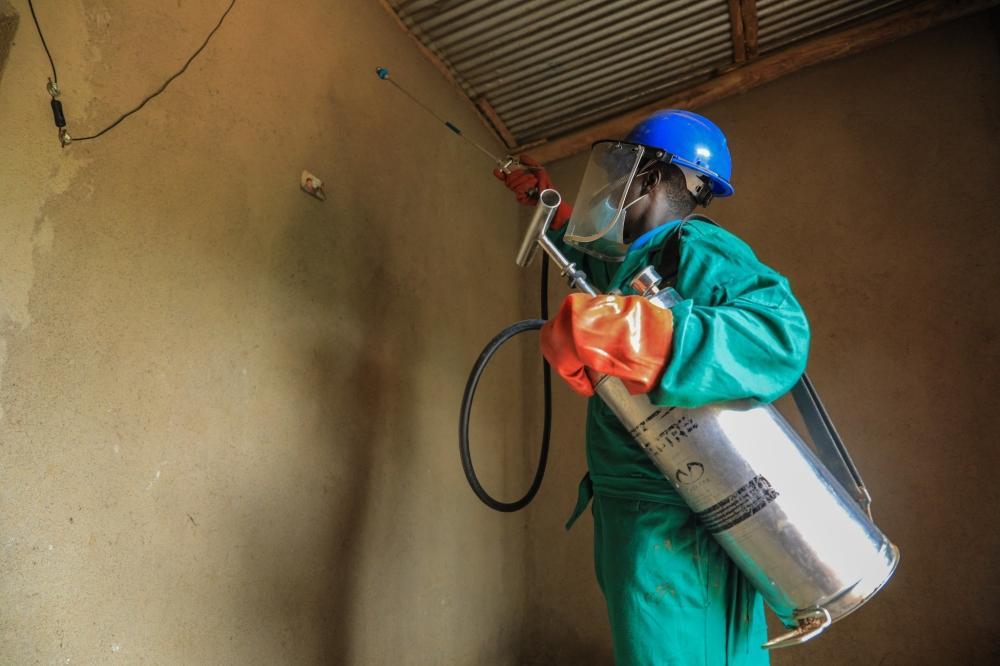Africa-Press – Rwanda. Rwanda will join the rest of the world in observing World Malaria Day on Friday, April 25, with a national event set to take place in Ndera Sector, Gasabo District, an area with the highest malaria burden in the country. This year’s global theme, “Malaria Ends with Us: Reinvest, Reimagine, Reignite,” calls for renewed energy and commitment at all levels from policy to community action, to strengthen the fight against malaria.
According to Dr. Aimable Mbituyumuremyi, the Division Manager for Malaria and Neglected Tropical Diseases at Rwanda Biomedical Center (RBC), the event will focus on mobilizing communities to take charge of malaria prevention and response.
“We will be conducting community-based activities, including educating the public and supporting reactive case detection,” he said.
This strategy, currently being rolled out in high-burden areas, involves testing and treating all household members when one person is diagnosed, targeting cases that may otherwise go unnoticed.
The Ministry of Health and RBC will launch a community-based surveillance and response system and distribute insecticide-treated bed nets to vulnerable households as part of broader prevention efforts.
Rwanda registered a reduction in malaria cases from 4.8 million to 620,000 cases between 2016/2017 and 2023/2024 fiscal years. Malaria-related deaths also dropped during the same period.
However, malaria remains a public health challenge, with 802,428 cases recorded in 2024.
Between January and October 2024, the country reported 630,000 malaria cases, an increase from 432,000 cases recorded during the same period in 2023. In October alone, the number rose to 112,000, with 89 percent of these cases reported across 15 districts.
More than half of those October cases 58,000 were registered in only 25 sectors from Gisagara, Bugesera, Gasabo, Kicukiro, Nyanza, Nyamasheke, and Nyagatare districts.
The resurgence in cases is driven by a combination of environmental and human factors.
Mosquitoes are increasingly biting people outdoors, which undermines the protection provided by indoor interventions like treated nets and indoor residual spraying. Insecticide resistance is also rising, especially to chemicals used in older nets and sprays, Dr. Mbituyumuremyi said.
He noted that breeding sites around rice fields, mining zones, and areas with stagnant water have expanded mosquito populations, particularly in Eastern Province, which has experienced a heavy malaria burden due to increased rainfall and poor drainage.
Improper use of medication is another major concern, as self-medication, incorrect dosages, and failure to complete treatment contribute to malaria resistance.
“When people take medication without professional guidance or stop treatment midway, it allows the malaria pathogen to develop resistance. In areas with frequent infections, many resort to self-treatment, which only worsens the issue.”
To respond to the growing resistance, especially to Artemether-Lumefantrine (Coartem), Rwanda introduced two new treatment options in January; Dihydroartemisinin-piperaquine (DHAP) and artesunate-pyronaridine (ASPY). Patients who don’t improve on Coartem within three days are switched to one of the new drugs. Early results are promising, with improved recovery reported in several cases, officials say.
The government has been rolling out more effective bed nets to fight insecticide-resistant mosquitoes. Since 2020, PBO nets and G2 nets have been distributed, offering better protection, and a new phase of treated nets is already being prepared for deployment.
Behavioural habits continue to be a challenge. For instance, in high-risk areas, many people still don’t use bed nets consistently, or they delay seeking treatment when they need it.
Outdoor workers like farmers, miners, and night security guards, are particularly exposed and often don’t seek timely care.
Pregnant women and children under five, who are among the most vulnerable, are being reached through routine distribution of nets during antenatal visits and immunization sessions.
Rwanda continues to stand out globally for its strong commitment to malaria elimination. To reduce malaria cases by 75% by 2025, officials are confident that this target is achievable, so long as prevention, treatment, and surveillance strategies continue to advance.
Countries like Nigeria and Egypt made progress in eliminating malaria through integrated vector control strategies. According to Dr. Mbituyumuremyi, Rwanda can follow a similar path if resistance issues are addressed and strategies continue to advance.
For More News And Analysis About Rwanda Follow Africa-Press






